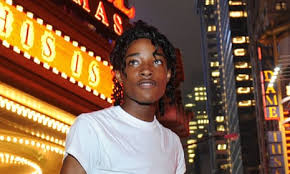How Dare You, America
Bearing witness to the lynching of Jordan Neely in New York City.
Another Black person was lynched last week.
Another.
That sentence, a savage declaration, a lamentation of heartache and sorrow, should pierce through the marrow of your bones, and sear itself to the depths of your soul. It is a truth which echoes like the mournful cry of a mother who has lost her child, like the rattle of old chains that still seek to shackle our bodies. When said aloud, it should roll off the tongue with the sound of thunder, shaking the very foundations of a society that has long been dishonest about its own cruelty.
Jordan Neely was lynched last week. Jordan Neely, was choked for nearly fifteen minutes by a white former marine, for having the audacity to shout on a subway car about his hunger, his thirst, his houselessness. For daring to expose the raw truth of America’s failures.
As difficult as it may be, don’t look away. For each time you opt to turn your gaze to something more comforting, something easier, the hands that clutch at our throats swell with a sinister vitality, fed by your own indifference. The systems and the people that hunt us down—those relentless predators—thrive in apathy, nourished by silence.
Do not look away.
How dare America act as judge, jury, and executioner for people simply wading through waters poisoned by this wicked nation’s own godlessnesses.
This thought has sat with me in various ways since I was but a young child, when I began to understand the hypocrisy and hatred that courses through the veins of a country that believes it owns me. A country that believes it owned Jordan Neely.
How dare this depraved nation.
As the sun rose in a cloudless sky, the light diffusing softly through the window, casting warm shadows on my bedroom walls. The quiet of the morning disturbed only by the soft, rhythmic tapping of my fingers on my phone screen. I came across a post that immediately grabbed my attention.
“He was hungry and thirsty. He just needed help. He wasn’t hurting anyone.”
A young Black man lay on the cold, unforgiving floor. His body twisted, writhing like a nightmare in which flight is impossible but the fall is imminent. A white man’s arm, pale and insistent, locked around his neck, squeezing the life from him. The Black man’s eyes, wide and pleading, seemed to reach out, grasping for the oxygen he was being denied — or maybe they were reaching out for the help everyone on the train decided he didn’t deserve.
The help this nation decided he wasn’t worthy of.
Two other men, one white, one a person of color, knelt beside him, holding him down, their hands pressing into his flesh, as if trying to mold his body into something more palatable, something more easily consumed. Something less houseless, less mentally ill, less Black.
A few inches away, a white woman stood, her gaze locked onto the scene before her. Her expression, a mixture of curiosity and detachment, underscored by a quiet complicity. She looked down, her eyes as cold as the steel tracks that lay beneath the subway car, witnessing the life being forced out of another human being. No one did anything to help him.
Savagely, unrepentantly, and unceremoniously snuffed out. His name was Jordan Neely, and he is gone.
In the tender ache of my heart, I steeled myself to watch the actual video of the moment, to bear witness to the unspeakable violence that unfolded. I do not claim that one must watch such horrors to grasp the urgency of dismantling the systems that enable them. But for me, it was a necessity, a responsibility I carried on my weary shoulders.
All while harming no one.
I cannot shake the image of Jordan Neely’s lifeless body from my mind, it sits in the many hollow spaces this Black American life has created in my heart. The bitter truth that not one soul was immediately charged with a crime for this abhorrent act feels like a stone lodged in my throat. As I pen this, even the names of the perpetrators remain shrouded in secrecy, as though their heinous deeds deserve protection.
Fifteen minutes. An eternity. Seven minutes and fourteen seconds longer than George Floyd’s last breaths, which birthed one of the largest moments of civil protest in world history. A period touted by some as a “ racial awakening”. Nearly three years later, and still, the cycle continues.
You don’t have to like me — just stay in your lane.
A subway car, for many, serves as a means to reach a destination. For others, it offers a fleeting sense of refuge, a place to rest your head, a home. As subway riding New Yorkers, I imagined we all understood: if you find yourself uneasy in the presence of another’s suffering, you simply move to another car.
I was wrong. I am sorry, Jordan.
The smirk etched across the face of the man as he stole the life from Jordan did not astonish me, nor did the terror imprinted on Jordan’s face as life slipped away from him. The fact that no one did anything didn’t startle me. The comments online did not leave me in a daze. By now, there is little left that America can inflict upon a Black body that would surprise me.
Poverty, mental illness, and Blackness.
Proof of this rests at the center of the dehumanizing comments made by New York Governor, Kathy Hochul and New York City Mayor, Eric Adams.
Hochul responded to the tragedy by saying, “People who are homeless in our subways, many of them in the throes of mental health episodes, and that’s what I believe were some of the factors involved here. There’s consequences for behavior…”
Adams refused to condemn the act, stating, “Each situation is different…. We cannot just blanketly say what a passenger should or should not do in a situation like that.”









